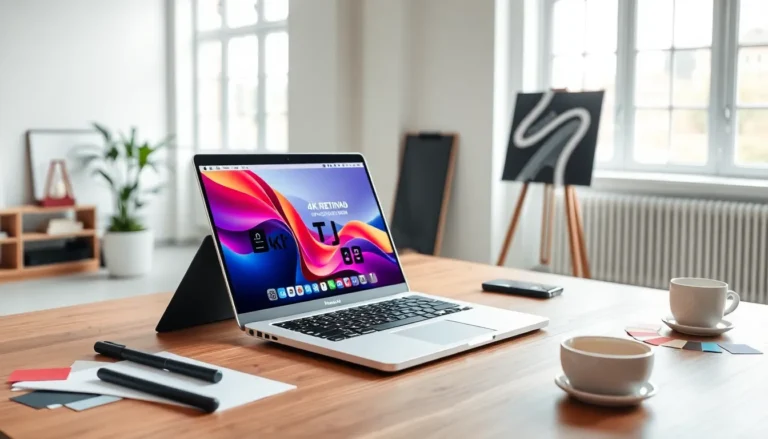Engineers know that the right tools can make or break a project. When it comes to laptops, it’s not just about sleek designs or fancy colors—it’s about performance that can handle everything from complex simulations to late-night coding marathons. Choosing the best laptop can feel like searching for a needle in a haystack, especially with all the options out there.
Table of Contents
ToggleOverview of Best Laptops for Engineers
Engineers require laptops that excel in processing power and durability. Performance, battery life, and display quality stand out as critical factors. High-end processors like Intel Core i7 or i9 significantly enhance computational efficiency. Models equipped with at least 16GB RAM manage multitasking effectively, allowing smooth operation of design and simulation software.
Graphics performance is equally important for visual tasks. Laptops featuring dedicated graphics cards, such as NVIDIA GeForce GTX or RTX series, support rendering 3D models and running simulations with ease. Storage options also matter, with solid-state drives (SSDs) delivering faster load times and improved data access compared to traditional hard drives.
Portability is a necessary consideration for engineers frequently working on-site. Lighter laptops that weigh under 4 pounds and have slim profiles facilitate easy transport without compromising performance. Battery life, ideally lasting 8 hours or more, supports productivity during long projects.
Durability contributes to long-term usability. Laptops designed with robust build quality and keyboard comfort prove beneficial for heavy daily use. Brands like Dell, Lenovo, and Apple showcase laptops specifically tailored for engineering tasks, integrating essential features like high-resolution displays and advanced cooling systems.
Budget constraints also play a role in laptop selection. Mid-range options priced between $1,000 and $1,500 can meet the requirements of most engineering students. Those needing advanced features may invest in premium models, often exceeding $2,000. Meeting each of these criteria leads to a well-rounded choice, supporting the diverse needs of engineers in various fields.
Key Features to Consider

Selecting the right laptop for engineers necessitates attention to several critical features that ensure optimal performance for demanding tasks.
Performance Specifications
Performance specifications play a vital role for engineers. High-end processors like Intel Core i7 or i9 deliver the computational power necessary for complex simulations and programming. Equipping laptops with at least 16GB of RAM enhances multitasking capabilities, ensuring smooth operation during resource-intensive projects. Graphics performance significantly impacts 3D modeling and rendering tasks; therefore, dedicated graphics cards such as NVIDIA GeForce GTX or RTX series are essential. These components collectively contribute to a highly efficient workflow, making them indispensable for engineering applications.
Portability and Battery Life
Portability and battery life frequently influence engineering professionals. Lightweight laptops under 4 pounds facilitate easy transport, especially for those working on-site. Aiming for battery life that exceeds 8 hours prevents interruptions during busy workdays. These features allow engineers to remain productive during travel or in various locations without the constant need for a power outlet. Prioritizing these aspects ensures that laptops meet the on-the-go needs of engineering tasks.
Display Quality
Display quality is crucial for clarity during detailed design work. High-resolution screens provide sharper images and better color accuracy, which is essential for accurate simulations and presentations. Engineers often benefit from displays that support 4K resolution or Full HD to enhance visual detail. A suitable screen size of 15 inches or larger can improve user experience by providing ample workspace. Selecting laptops with anti-glare displays can also enhance usability in bright environments, making these characteristics indispensable for engineering professionals.
Top Laptops for Engineering Students
Selecting the right laptop can significantly impact an engineering student’s success. Performance, durability, and functionality take precedence when choosing a suitable model.
Laptop Model One
The Dell XPS 15 often ranks among the top choices for engineering students. This laptop boasts an Intel Core i7 processor and 16GB of RAM, allowing for seamless multitasking during demanding tasks. A dedicated NVIDIA GeForce GTX graphics card enhances its performance for 3D rendering and simulations. Additionally, its 15.6-inch 4K display provides stunning clarity, which proves invaluable for detailed design work. Weighing just over 4 pounds, portability remains a key feature that allows students to take it anywhere. With a battery life reaching 8 hours, it supports long study sessions without needing frequent recharges.
Laptop Model Two
The Lenovo ThinkPad P53 serves professional needs exceptionally well. Equipped with an Intel Core i7 CPU and options for up to 64GB of RAM, this laptop handles heavy engineering applications effortlessly. Its NVIDIA Quadro T1000 graphics card delivers the necessary power for complex computations and graphics performance. Furthermore, the 15.6-inch display offers vibrant colors and excellent brightness, which enhances productivity during long hours of work. Weighing around 5 pounds, it maintains a robust build quality ideal for everyday wear and tear. A battery life of 9 hours extends usability, making it an excellent choice for those constantly on the go.
Best Laptops for Professional Engineers
Selecting the right laptop is crucial for professional engineers. Focus on performance, durability, and superior specifications.
Laptop Model Three
The HP ZBook Studio G7 stands out with its Intel Core i7 processor and up to 32GB of RAM. It features NVIDIA GeForce GTX 1650 graphics, essential for complex design work. A stunning 15.6-inch 4K display provides sharp visuals for intricate engineering projects. Battery life reaches up to 10 hours, allowing engineers to work efficiently on-the-go. Weighing around 4 pounds, this model remains portable without sacrificing power. Built to withstand the rigors of daily use, it combines durability with sleek aesthetics. As a result, the HP ZBook Studio G7 is an excellent choice for engineers seeking reliability and high performance.
Laptop Model Four
The ASUS ROG Zephyrus G14 offers impressive specifications tailored for engineering tasks. An AMD Ryzen 9 processor and up to 32GB of RAM support demanding software applications efficiently. This laptop includes an NVIDIA GeForce RTX 2060 GPU, providing exceptional graphics performance for 3D modeling and simulations. A 14-inch QHD display enhances detail visibility, making it ideal for precise work. Battery life extends to 10 hours, ensuring productivity during travel. At approximately 3.5 pounds, it remains lightweight and portable. This combination of power and portability makes the ASUS ROG Zephyrus G14 a fantastic option for engineers needing versatile performance.
Budget-Friendly Options
Engineers often seek laptops that balance performance and cost. Here are two affordable options that deliver excellent value.
Affordable Laptop Model Five
The Acer Aspire 5 offers a solid choice for engineers on a budget. Featuring an Intel Core i5 processor, it supports multitasking with ease. This model comes with 8GB of RAM, enabling smooth performance for essential engineering applications. A 256GB SSD provides ample storage while ensuring quick access to files and programs. The 15.6-inch full HD display enhances clarity for design tasks. Weighing just 4.2 pounds, the device remains portable for on-the-go use. Battery life reaches up to 8 hours, allowing engineers to work longer without charging. This mix of specifications makes the Acer Aspire 5 a practical selection for students and professionals alike.
Affordable Laptop Model Six
The ASUS VivoBook 15 stands out as another budget-friendly option. Its Intel Core i5 processor combined with 8GB of RAM handles engineering software with confidence. A 512GB SSD offers generous storage, accommodating various projects without lag. Users benefit from a 15.6-inch full HD display that presents intricate designs in detail. Weighing approximately 3.5 pounds, the laptop excels in mobility. With up to 7 hours of battery life, it supports extended use during classes or in the field. Overall, the ASUS VivoBook 15 provides a reliable solution for engineering students seeking performance without compromising on cost.
Choosing the right laptop for engineering tasks is essential for maximizing productivity and efficiency. Engineers need devices that can handle demanding applications while remaining portable and durable. The recommended laptops provide a range of options to suit various needs and budgets, ensuring that both students and professionals can find a suitable choice.
With high-performance specifications and reliable battery life, these laptops empower engineers to tackle complex projects with ease. Prioritizing functionality over aesthetics leads to better long-term satisfaction and success in the engineering field. Investing in the right laptop can make all the difference in achieving engineering goals and enhancing overall workflow.





